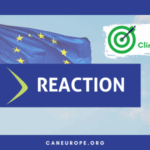| Brussels, 6 February 2024 On the European Commission’s Communication on a 2040 target, CAN Europe recognises that a 90% reduction target constitutes an increased level of ambition. Aiming for anything less than net zero by 2040 though shows a lack of global leadership and contradicts the EU’s fair share commitment to fulfilling the 1.5°C goal of the Paris Agreement. By not targeting net zero by 2040, the EU is missing a pivotal chance to access significant environmental, social and economic benefits.
Lack of political ambition and not setting science-based targets is costly in the face of the extreme climate events that have become ever more frequent. Continuing the trend of striving for insufficient climate targets will put millions of lives at risk—with the poorest and the most vulnerable in society poised to suffer the most. Both the European Scientific Advisory Board on Climate Change (ESABCC) and the European Commission’s own impact assessment have demonstrated the multiple benefits of pursuing ambitious climate policies. By communicating an intended 90% reduction target today, the European Commission ignores the higher end of the range recommended by its own Impact Assessment and the ESABCC (95%).
‘Increased ambition is of course welcomed – but a 90% reduction target is still not enough to properly align with the 1.5°C goal. Real solutions to achieve net zero by 2040 are evident – we just need the political courage that matches the scale of the challenges we are facing’ said Chiara Martinelli, Director, CAN Europe. ‘Recent research from CAN Europe indicates that aligning with a net-zero goal by 2040 now, would yield economic benefits of at least €1 trillion by 2030. By opting for a less ambitious stance, the European Commission is missing a golden opportunity to access these benefits’.
In the pursuit of achieving net zero by 2040, European policymakers need not look further than existing pragmatic solutions. The critical phasing-out of fossil fuels should be of the highest priority, with coal targeted for elimination by 2030, fossil gas by 2035 and oil by 2040. Simultaneously, the deployment of renewable energy needs to be accelerated to reach a fully renewables based energy system by 2040, with a primary focus on wind and solar, as well as enhancing the flexibility of the energy system. Efforts to curtail energy and material demand should be expanded and greater recognition given to the role of restoring nature to remove carbon from ecosystems. Public funding for this drive should be coupled with a steadfast commitment to the polluter pays principle and a concrete plan for a redistributive agenda. These solutions are not new ideas – but higher levels of political ambition are needed in order to accelerate their deployment and reach net zero by 2040.
‘The upcoming elections provide a huge opportunity for citizens to vote for an agenda that will prioritise both higher climate ambition, and reducing inequality’ said Chiara Martinelli, Director, CAN Europe.’The next European Parliament needs to be one that is willing to stand up for a holistic social-ecological vision. One that stresses the importance of reducing environmental degradation. And one that works to reduce the societal inequalities that climate inaction has widened. To this end, CAN Europe and its extensive network will be working tirelessly ahead of the elections to help citizens make informed choices on climate and social issues when heading to the ballot box’.
—ENDS—
Notes to the editor:
- Climate Action Network (CAN) Europe is Europe’s leading NGO coalition fighting dangerous climate change. We are a unique network, in which environmental and development organisations work together to issue joint lobby campaigns and maximise their impact. With over 200 member organisations active in 40 European countries, representing over 1,700 NGOs and more than 40 million citizens, CAN Europe promotes sustainable climate, energy and development policies throughout Europe.
- More details on how a net-zero goal by 2040 now would yield economic benefits of at least €1 trillion by 2030 can be found in CAN Europe’s report ‘Paris Pact Payoff: Speeding up the green transition for socio-economic co-benefits’: https://is.gd/cobenefits
|



